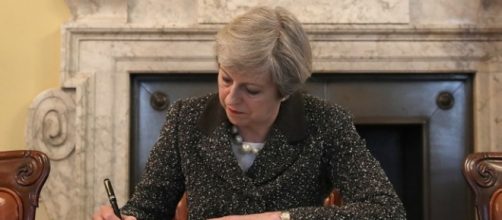It's a question of interpretation. A little before 12:30pm on March 29, 2017, Theresa May, the controversial Prime Minister of the United Kingdom, triggered Article 50. Her letter to the european union essentially warned foreign leaders that if they could not agree to terms with a British exit agreement concerning home affairs and justice, they may soon experience less British cooperation on crime and security.
To fully understand the significance of the letter, you must first understand the severity of "Article 50". Basically, it gives any member of the European Union the right to leave the Union without first needing approval from any other country.
The article gives the departing country two years to negotiate an "exit deal," and once it starts, nothing save unanimous consent of all other member states can stop it.
No country has ever left the Union before, and prior to the signing of the Treaty of Lisbon in 2007, there was no legal way to leave it anyway.
Certain parties interpret the letter very differently
Brexit secretary David Davis is adamant that the letter was not a threat, and that the implications behind the letter were purely positive.
Former Belgian prime minister Guy Verhofstadt, along with many others, doesn't agree. According to a report by theguardian.com, Verhofstadt called May's Article 50 letter "a threat," and indicated that the safety of European citizens was "far too important to start a trade-off of one and the other." The popular British newspaper The Sun's headline "Your money or your lives" on Thursday also seemed to imply that British ministers could very well opt to be less cooperative in terms of security if a trade deal can't be reached.
In a BBC Radio 4's program, Davis says instead that "What the prime minister was saying was that if we have no deal, and we want a deal, it's bad for both of us. If we don't have a deal, what we are going to lose is the current arrangement on justice and home affairs."
Looking forward
British Home Secretary Amber Rudd also says that the UK is not at all issuing any sort of threat, but she did add that security cooperation between the UK and the EU was something that would seriously need to be worked out post-Brexit.
She indicates that for some large scale security programs like Europol, the UK is the largest contributor. Leaving the Union would undoubtedly mean taking information with them. Officials of both countries would have to come to some sort of agreement.
Understandably, the European commission is focused first on the logistics of British departure, and issues regarding an ongoing relationship they'll address afterward.

